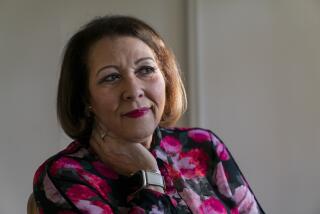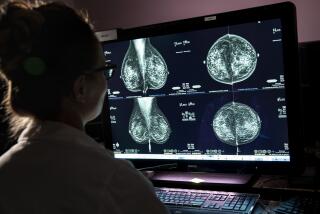Mammogram Basics
Getting an accurate test:
The U.S. Food and Drug Administration regulates clinics, doctors’ offices and other facilities where mammograms are performed to monitor their compliance with quality standards.
Experts urge women to get their mammograms done at centers that specialize in breast imaging or perform at least a dozen mammograms a day. Ask if the center has data on the accuracy of its mammograms because the better imaging centers usually do. If the center’s detection rate is less than 80%, which is the national average, consider going elsewhere.
The American Cancer Society offers these other suggestions for ensuring that you get a quality mammogram:
* If you’re satisfied with a facility, continue to go there on a regular basis so your mammograms can be compared from one year to the next.
* If you switch centers, bring your old mammograms with you so they can be compared to the new ones.
* If you have sensitive breasts, schedule your mammogram at the time of the month when your breasts will be least tender--at least a week before your period. This will help lessen discomfort and reduce chances you’ll move unexpectedly during the scan.
* Don’t wear deodorant, powder or cream under your arms; it can interfere with the quality of the mammogram.
The FDA maintains a list of certified mammography centers at its Web site: https://www.fda.gov/cdrh/mammography.certified.html. The National Cancer Institute also keeps a list of certified facilities. For information, call (800) 4-CANCER.
*
When the mammogram results are not clear-cut:
When a mammogram is inconclusive, the next steps are usually an additional magnified mammographic view, which often can detect calcium spots, or ultrasound, which can sometimes distinguish whether a mass is a tumor or a harmless cyst.
If these tests also are inconclusive, doctors will then do a needle aspiration to remove cells from the abnormal area. Or they may do a breast biopsy, a surgical procedure that entails removing a small sliver of breast tissue and examining it under a microscope to determine whether it is cancerous. But the good news is that in eight out of 10 cases, the tumors aren’t malignant.
*
Assessing your risk:
Women who are at greater risk of breast cancer should consider getting annual screenings beginning at age 35--or, in some cases, in their late 20s or early 30s. They should also get a manual breast exam by a trained specialist every six months.
The six most common risk factors are: a previous incidence of breast cancer; either of the two genetic mutations called BRCA1 and BRCA2; two or more breast biopsies; a finding of atypical cells on a biopsy; 75% dense breast tissue; and a mother, sister or daughter with breast cancer.
Other risk factors, such as having a first child at age 30 or older, or starting menstruation before age 12, are not as significant.
But even the major risk factors are relative. “The big drivers of risk are genetic predispositions, family history and worrisome breast biopsies,” says Dr. Patricia A. Ganz, director of cancer prevention and control research at UCLA’s Jonsson Cancer Center. “But if your mother died of breast cancer at age 70, your risks are lower than someone whose mother succumbed in her 30s.”
For more information about risk assessment, contact the UCLA Breast Center or visit its Web site at https://www.cancer.mednet.ucla.edu.
*
If you have breast implants:
Breast implants can mask the presence of early-stage tumors. A recently completed UCLA study revealed that implants reduce the sensitivity of mammograms by at least 50%. Consequently, women with augmentation need to get mammograms performed at imaging centers where doctors have experience with patients with implants. Normally, radiologists take twice as many pictures as they would of a normal breast in order to optimize their assessment of breast tissue.
*
How to do a breast self-exam:
For a diagram, go to the Women.com Web site at https://www.women.com/health/breastcancer/self-exam.






